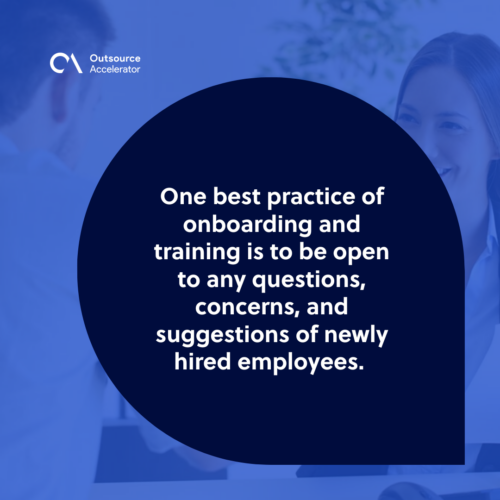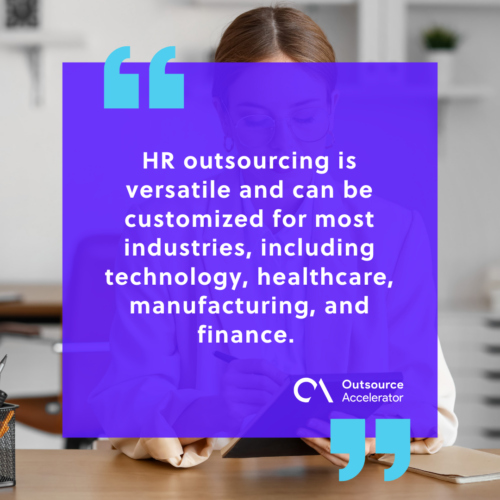HR outsourcing: An introductory guide

The best approach to building workplace culture is centered on employee engagement and staff recognition. After all, they are the company’s backbone.
If one is considering applying for or hiring new employees in their organization, be sure there is sufficient qualified manpower available all throughout the industry at all times.
HR outsourcing can help companies carry out responsibilities without much of a hassle—especially administrative duties. Repetitive tasks can unwittingly pile up and impede the department’s productivity.
What is HR outsourcing?
HR outsourcing involves offloading some of a company’s HR tasks to an external provider.
In this case, some HR activities are outsourced to third-party services companies to lessen the burden of additional workload on the internal team.
Outsourcing as a business guide
Industry leaders have developed outsourcing to be as cost-effective as possible.
Many business process outsourcing companies are still offering this guide as one of the most popular ways to reduce overhead costs and unnecessary expenses.

HR outsourcing services
Even in outsourcing, there are still trends and changes that industry leaders and analysts have to watch out for. Their positions allow them to be ahead of the game, and thus, their opinions are greatly respected by their peers.
The current trend in HR outsourcing services has seen a significant rise in the adoption of innovative models such as the professional employer organization (PEO).
As organizations increasingly seek comprehensive HR solutions, the role of the HR outsourcing provider becomes crucial in providing specialized services tailored to meet businesses’ evolving needs.
This trend challenges traditional models, including the reliance on an in-house HR team, as companies explore new avenues for:
- Efficiency
- Cost-effectiveness
- Strategic HR management
Keeping abreast of these trends is essential for industry leaders and analysts to provide informed insights into the dynamic landscape of HR outsourcing services.
The following are some of the commonly outsourced HR functions:
Talent acquisition
Talent acquisition is the process of sourcing, interviewing, and hiring applicants.
Most efforts are made in human resources management as they are well-equipped to deal with candidates. However, certain companies, especially international conglomerates, outsource their TA activities.
From sourcing candidates up to hiring, these corporations chose to outsource these activities to third parties.
Admin tasks
Administrative tasks, as mentioned above, accumulate faster than one can imagine.
Legal paperwork, updating employee records, and straightening out benefits are all important tasks, but they can also overshadow some of the department’s main functions.
That’s why some businesses often outsource these administrative tasks to trusted third-party entities (companies and individuals) — such as Booth and Partners.
Payroll processing
Outsourcing payroll processing is a strategic choice for businesses aiming to streamline their financial operations. This is particularly helpful for organizations with 1,000 or more employees.
In-house payroll administration staff may find it hard to manage the intricacies associated with large-scale payroll tasks efficiently.
By entrusting this critical function to specialized service providers, companies can ensure accurate and timely payroll management, reducing the risk of errors and compliance issues.
Training and development
Efficient training and development programs are integral to organizational growth.
Outsourcing this aspect of HR services allows companies to tap into expert resources for designing and delivering effective training modules. This HR outsourcing service can also help firms strengthen their employee relations, resulting in a higher employee retention rate.
Benefits administration
Outsourcing benefits administration is a practical solution for handling complex employee benefit programs.
Experienced service providers manage tasks such as health insurance, retirement plans, and other employee benefits. They relieve organizations of the administrative burden associated with benefits management.
HR outsourcing best practices
When it comes to HR outsourcing, it’s pertinent to have best practices set in place. The human resource department is a sensitive area in a company. It handles employees, their well-being, and the company’s policies.
It’s just right that best practices should reflect the mission and the vision of the company.
Recruitment and talent acquisition
Recruitment and selection of applicants should be welcoming, professional, and friendly. These two shouldn’t act as the company’s “gate”; talent acquisition specialists shouldn’t act as gatekeepers.
One of the most jarring situations for applicants is when the interviewer (usually TA specialists) doesn’t give them the chance to prove that they’re capable.
For instance, instead of asking probing and follow-up questions, they would try to invalidate their experiences.
To combat this, companies should train their talent acquisition specialists on how to deal with people, bordering on empathy and professionalism correctly.
Onboarding and training
Onboarding and training are undoubtedly two of the most important parts of the new hire experience. One best practice for onboarding and training is to be open to newly hired employees’ questions, concerns, and suggestions.
This way, the company can have insight from a newcomer’s perspective.

Transparency among the employees
No matter how small or big, good or bad the news is, it should be the management’s priority to keep their employees updated.
Oftentimes, the HR department is the main channel for the top management to pump out company-wide emails and updates.
Transparency in staff recognition
Recognizing the staff gives them the platform and opportunity to be role models for the rest of the employees. When it comes down to recognizing the efforts of the workforce, companies should be able to commend these individuals positively.
Another key to successfully running a company is cultivating a healthy and positive workplace.
Continuous learning
As all professional employees know and understand, each sector grows exponentially. For them to catch up, they have to upskill, challenge, and hone what they know.
Continuous improvement and learning programs can be offered by the company and run by the HR department.
Employee benefits, incentives, and compensation
These three—benefits, incentives, and, most importantly, compensation—are just some of the motivators that employees look forward to. One best practice that comes to mind is being generous to deserving employees.
Even when outsourcing the HR department, these should still be a priority to the company.
Compliance
When it comes to compliance, the HR department should be able to hold employees accountable for their actions as a best practice.
Not only does this make the workplace safer and more efficient, but it also evens out the “playing field” for each and every employee in the company.
Sanctions, termination, and resignation
As much as everyone hates to go through sanctions, terminations, and resignations, companies and their respective HR departments (or HR outsourcing partners) should still have best practices in place.
From due process to complete documentation and clearance, the HR department should be able to handle these objectively.
Under any circumstances should the HR department give sanctioned/terminated/resigning employees a hard time processing their papers.
Benefits of outsourcing HR services
HR outsourcing, like any other outsourcing practice out there, has benefits that can tremendously help businesses and companies while saving up resourcing.
The biggest benefit of the model is this: A more efficient overall cost-cutting approach will result in a better outcome and internal satisfaction for the business.
Higher employee satisfaction
The key to having a successful workforce is employee satisfaction. Some might say that outsourcing jobs can lead to further job dissatisfaction, but let’s take a closer look at the other side of the argument.
Outsourcing allows businesses to “expand” their operations, and this expansion allows the outsourcing company to open its doors to the public.
This means there are more opportunities to have a stable job, especially in this economy.
Lower overhead costs
Outsourcing is a business model developed to be more efficient and cost-effective without the added hassle of physically expanding and hiring an extra labor force.
There are two common ways to outsource HR services.
The parent business (client) either outsources the work to an outsourcing company (provider), or the client outsources the work to a freelancer or independent contractor.
Either way, it’s less expensive than hiring internal teams.
The client doesn’t have to pay any mandatory benefits (401K, medical, dental), as the provider or the contractor shoulders the cost for them.

Flexibility is now an option
Flexibility when it comes to workload, that is.
Outsourcing means that an internal team’s (repetitive) workload can be lightened, thus making them more flexible when a bigger project comes along.
Working with HR experts
Outsourcing allows businesses to tap into an unending supply of talent and highly qualified applicants. HR outsourcing does the same things, but it’s limited to the field of human resources.
Nevertheless, having an abundance of experts in the field is never a bad thing.
How much does HR outsourcing cost?
The cost of HR outsourcing depends on multiple factors, including the scope of services required, the size of the organization, and its location.
Here are common pricing models and estimates:
- Per Employee, Per Month (PEPM) fees – Many HR outsourcing providers charge a flat rate per employee, often ranging from $50 to $200 per month. This model allows companies to scale costs based on the size of their workforce.
- Percentage of payroll – Some providers charge based on a percentage of total payroll, usually between 2% and 8%, which can be more predictable for businesses with steady payroll expenses.
- Project-based fees – For specific, one-time HR projects, such as audits, recruitment drives, or compliance checks, some providers charge on a project basis. These fees vary widely, depending on the complexity and duration of the project.
- Customized packages – Many providers offer tailored packages that can be customized based on company needs, budget, and industry-specific requirements. This model can combine various pricing structures for flexibility.
HR outsourcing FAQs
Below are some commonly asked questions regarding HR outsourcing:
Why do companies choose HR outsourcing?
Companies opt for HR outsourcing to reduce costs, improve operational efficiency, access expert HR knowledge, and streamline HR processes.
Outsourcing can also enhance compliance with labor regulations and allow companies to scale their HR operations according to business needs.
What are the risks of HR outsourcing?
Potential risks of HR outsourcing include loss of control over certain HR functions, confidentiality concerns, and dependency on the service provider’s quality of work. Choosing a reputable provider and setting clear expectations can help mitigate these risks.
How can I find the right HR outsourcing provider?
To find a suitable provider, evaluate your company’s specific needs, research providers’ reputations and service offerings, and ask for referrals.
Consulting reviews and requesting proposals from multiple providers can help you make an informed decision.
Yes, HR outsourcing can be highly beneficial for small businesses. It offers access to expert HR support without the expense of a full in-house team, which can improve efficiency, streamline HR processes, and help manage compliance requirements effectively.

Is HR outsourcing suitable for all industries?
HR outsourcing is versatile and can be customized for most industries, including technology, healthcare, manufacturing, and finance.
However, each company’s specific HR needs and regulatory requirements should be considered when deciding to outsource.
Outsourcing HR functions: A guide for 2025
HR outsourcing trends are ramping up for the next year. From diversity, inclusivity, and equal opportunities to all, these things are coming up fast.
The general progress of the public towards these movements can be considered a big shift for businesses as well.
While society still has a long way to go, observing these things in the workplace is key to having a diverse and positive workforce.
Furthermore, this HR outsourcing guide provides valuable insights into the benefits and considerations associated with partnering with an HR outsourcing company.
Understanding the intricacies of outsourcing HR functions can empower your organization to streamline processes, enhance efficiency, and focus on core business activities.
We hope you find this useful as it can help your organization to make informed decisions and optimize its human resources management for sustained success.







 Independent
Independent




